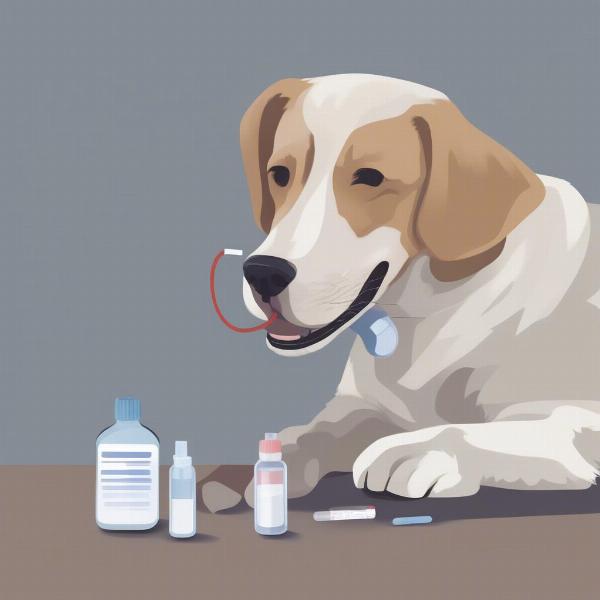If your dog is coughing and wheezing, it can be a worrying sign. These symptoms can indicate a range of issues, from a simple kennel cough to more serious conditions like heart or lung disease. Understanding the potential causes and knowing when to seek veterinary attention is crucial for your dog’s well-being. This article will guide you through the possible reasons behind your dog’s coughing and wheezing, helping you determine the best course of action.
Coughing and wheezing are not diseases themselves, but rather symptoms of an underlying problem. A cough is your dog’s way of clearing their airways of irritants, while wheezing is a whistling sound produced by restricted airflow. Several factors can trigger these symptoms, including infections, allergies, and even foreign objects lodged in the throat. The severity and frequency of coughing and wheezing, along with accompanying symptoms like lethargy, loss of appetite, or difficulty breathing, can help pinpoint the cause.
Identifying the Cause of Coughing and Wheezing
Pinpointing the exact cause of your dog’s coughing and wheezing can be challenging, as many conditions share similar symptoms. However, paying close attention to the nature of the cough and wheeze can provide valuable clues.
Types of Coughs and Wheezes
A dry, hacking cough might suggest kennel cough or bronchitis, while a moist, productive cough could indicate pneumonia or heart disease. A high-pitched wheeze often points to airway constriction, as seen in asthma or allergies, while a lower-pitched wheeze might be related to a partial obstruction in the lower airways.
Other Accompanying Symptoms
Observe your dog for other symptoms that may accompany the coughing and wheezing, such as nasal discharge, sneezing, eye discharge, fever, lethargy, or changes in appetite. These additional symptoms can help your veterinarian narrow down the possible diagnoses. For example, a dog with a cough, nasal discharge, and sneezing might be suffering from kennel cough, while a dog with a cough, wheezing, and difficulty breathing might have asthma or pneumonia.
When to Seek Veterinary Care
If your dog’s coughing and wheezing are persistent, worsen over time, or are accompanied by other concerning symptoms like difficulty breathing, lethargy, or loss of appetite, it’s essential to seek veterinary care immediately. Early diagnosis and treatment are crucial for managing the underlying condition and preventing potential complications.
Diagnosing the Problem
Your veterinarian will perform a thorough physical examination and may recommend diagnostic tests such as blood work, chest X-rays, or bronchoscopy to determine the cause of your dog’s coughing and wheezing.
Treatment and Management
Treatment for coughing and wheezing depends on the underlying cause. It can range from medications like antibiotics for infections or bronchodilators for asthma to supportive care for more serious conditions like heart disease. collapsed dog
 Dog Receiving Treatment
Dog Receiving Treatment
Home Care and Prevention
Maintaining a clean and healthy environment for your dog, ensuring they are up-to-date on vaccinations, and avoiding exposure to known irritants can help prevent respiratory problems. ap dog allergy dog rapid shallow breathing
Conclusion
Coughing and wheezing in dogs can be a sign of various underlying health issues. Prompt veterinary attention is crucial for accurate diagnosis and effective treatment. By carefully observing your dog’s symptoms and seeking professional help when necessary, you can ensure your furry friend receives the best possible care and enjoys a healthy, happy life. elderly dog pants a lot Don’t hesitate to contact your veterinarian if you have any concerns about your dog’s respiratory health.
FAQ
- How can I tell if my dog’s cough is serious? A persistent cough, difficulty breathing, changes in appetite or behavior, and a bluish tinge to the gums are all signs to seek immediate veterinary attention.
- Can allergies cause coughing and wheezing in dogs? Yes, allergies to pollen, dust mites, and other environmental allergens can trigger respiratory symptoms in dogs.
- Is kennel cough contagious to other dogs? Yes, kennel cough is highly contagious among dogs.
- What can I do to help my dog breathe easier at home? Using a humidifier, ensuring good ventilation, and keeping your dog’s environment free of dust and smoke can help alleviate respiratory distress.
- Can heartworm cause coughing in dogs? Yes, heartworm disease can lead to coughing, especially in advanced stages. dog panting while sleeping
- What are some common treatments for canine respiratory infections? Antibiotics, anti-inflammatory medications, and cough suppressants are commonly used to treat respiratory infections in dogs.
- How can I prevent my dog from getting kennel cough? Vaccination against Bordetella bronchiseptica, the primary bacteria responsible for kennel cough, can help protect your dog.
ILM Dog is a leading international dog website dedicated to providing expert advice on all aspects of dog care and well-being. From breed selection and health to training, nutrition, and grooming, ILM Dog offers a wealth of resources for both new and experienced dog owners. Contact us for expert advice at [email protected] or +44 20-3965-8624.